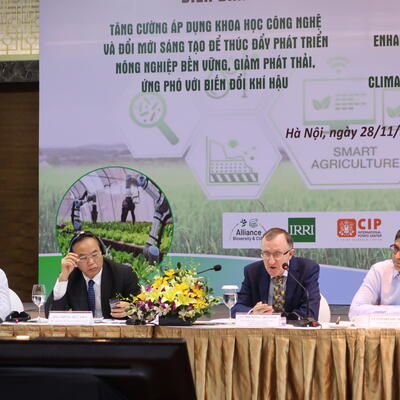
Local vendors, not supermarkets, are key to Africa’s food security
A new book released by the International Livestock Research Institute (ILRI) and partners — Food Safety and Informal Markets: Animal Products in Sub-Saharan Africa—probes the complicated world of traditional or ‘informal’ markets in livestock products. The book constitutes around 8 key messages of the Safe Food, Fair Food project (2008-2011) and 25 proof-of-concept studies from 8 countries across sub-Saharan Africa. The project was funded by the German Ministry for Economic Cooperation and Development and led by the International Livestock Research Institute. The research was implemented by our partners and their students:
- Centre Suisse de Recherches Scientifiques in Côte d’Ivoire and Mali
- University of Ghana
- University of Pretoria in South Africa
- Ministry of Agriculture and ILRI in Mozambique
- Sokoine University of Agriculture in Tanzania
- University of Nairobi in Kenya
- University of Addis Ababa in Ethiopia
- Free University of Berlin in Germany
- University of Stuttgart-Hohenheim in Germany
- Federal Institute for Risk Assessment (BfR), Germany
- Rakuno Gakuen University in Japan
The compilation and publishing of the book was funded by the CGIAR Research Program on Agriculture for Nutrition and Health, led by the International Food Policy Research Institute.
A book launched in Nairobi, Kenya, yesterday has lots to say to nutritionists and policymakers and government officials in Africa inclined to view the continent’s many ‘informal’ food markets with dismay. They’re not going away anytime soon, and they’re safer than they look. And they can be made even safer with the right support, the book reports.
‘Traditional markets sell more than 85 percent of the food consumed in sub-Saharan Africa, and rather than replacing them with Western-style supermarkets, governments should train local vendors to improve food safety, researchers say.
‘Contrary to popular conceptions, open-air local markets often have safer milk and meat than supermarkets in much of Africa, according to a book released on Tuesday by the International Livestock Research Institute (ILRI).
‘Local vendors offer fresher products to several hundred million low-income consumers, and many supermarkets still do not have well-regulated supply chains or stable refrigeration systems to…
View original post 380 more words





















